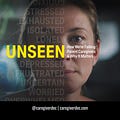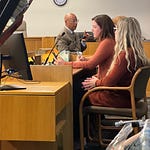“I went in with the assumption that there’s resources that are available. Now, that sounds crazy.” — Amanda Dyer, Unseen producer and co-director
It was kismet that brought filmmaker Amanda Dyer to produce the 46-minute documentary Unseen: How We’re Failing Parent Caregivers and Why It Matters.
Though married to co-director Tom Dyer, she does not have children and didn’t know anything about family caregiving. Dyer was simply looking for a new subject for a documentary. Soon after, she saw this Facebook comment:
“…this is why I so adamantly pursue a documentary about special needs families and the unique struggles we face. I firmly believe the only way we’ll see change is through making the public aware of what we go through.”
That was Jess Ronne. She and her 10-person family did in fact become the main subjects of the new documentary, which premiers online May 20-26.
“You have to keep moving forward because your child needs you,” Ronne explains in the intro. “It’s a lonely path. And often it is you, the caregiver, paving this path all by yourself for your child.”
“We’re hanging on by a thread most of the time,” adds her husband, Ryan.
In an interview with Medical Motherhood, Dyer said the three-year process of making the film was eye-opening.
“We didn’t know,” she said. “We didn’t know about this world. I went in with the assumption that there’s resources that are available. Now, that sounds crazy.”
Join the Medical Motherhood virtual watch party May 21! Details below.
Dyer said it was a challenge to help parent-caregivers feel comfortable enough to even talk about what was difficult due to there being enormous social pressure to stay quiet.
“From talking to a lot of parents we learned that they can feel very can feel judged if … they share their challenges or speak to any of the hardships — that they don't want to come off as complaining or acting like they don't love their child or something like that,” Dyer said. “That fact is causing a lot of parents to continue to isolate and not share their story fully.”
The filmmaker said that phenomenon means society is not addressing the needs of this population.
“Of course they love their children,” she said. “They are doing anything for them, sacrificing every single day for them because of how much they love them. But that doesn't mean that it's not hard at times and that our society and our systems and our individuals couldn't do a better job of supporting them and making that burden lighter on a daily basis.”
Another challenge in the project was finding statistics on this population. Dyer managed to find a 2009 report from the AARP claiming there are 16.8 million caregivers to disabled children under the age of 18, but noted that doesn’t include parents who still care for adult children.
“I think just the fact that I can't even find data on that speaks to the fact that we're just not really even looking at them as a distinct group,” she said.
Dyer notes that even though caregiving is becoming a hot topic nationally, the conversation still tends to focus on elder care. “The parent caregiving side of that is really going under the radar,” she said.
Ronne talks about this in the film, too. She was a caregiver to a spouse who died of a brain tumor and is now mother to eight children, one of whom has constant daily care needs. She can clearly see the difference between how she was treated as a caregiver to an adult versus how she is treated now as a caregiver to a child.
“Your house begins to feel like a tomb a little bit,” Ronne says in the film. “Because you’re just holed up at home trying to manage these needs and trying not to appear scary to the rest of the world.”
Now that the film is finished, Dyer said she is impressed at how much support the project is getting from nonprofits, organizations and the general public.
“I think there is more and more awareness that caregivers are a huge chunk of our population and it’s time that we start addressing that fact,” she said.
The hope is that people who see the film think about how they can help — either in their professional spheres of influence or their local community.
“Maybe you're a manager at a company and you have caregivers that work for you, mothers that work for you, and you could find ways to accommodate them better,” Dyer said, whether that’s a flexible schedule or work-from-home options.
Dyer said she also heard from parent-caregivers that little things can go a long way. Continuing to invite people out, even if they usually have to say no, or just reaching out with a text that you are thinking of them, can be a big deal.
But big things are also important, like moving to act to change the systems that make parent-caregivers’ lives so difficult.
Dyer noted a wave of new legislation in places like Nevada and Colorado that are finally recognizing the importance of parent-caregiving. She says a group in New York is also planning to show the film to legislators there.
As Licensed Clinical Social Worker Crystal Polk says in the film: “If you truly care about children with disabilities you need to also care about the parent-caregivers.”
Join the Medical Motherhood virtual watch party! Space is limited and subscribers will get priority to join the room. Saturday, May 21 at 12 p.m. (noon) Pacific Time at this link on Facebook Messenger: https://msngr.com/gxceqmqtnouv
Please note! This is a chat room so we can talk during and after the film. You will still need to buy a $10 ticket to see the premier. Do that here in advance. You can watch the film together with us in real time or, if you don’t have two straight hours to devote, watch at your convenience and join the room at 1 p.m. (Pacific) for the discussion.
Medical Motherhood’s news round up
Snippets of news and opinion from outlets around the world. Click the links for the full story.
• From the Southern Poverty Law Center: “‘Spare the Kids’: SPLC and other advocates push to end corporal punishment in schools”
[…]as the world commemorates International Day to End Corporal Punishment of Children on April 30, the Southern Poverty Law Center, along with other organizations and people, are continuing their advocacy to stop a practice that, according to research, has resulted in thousands of students seeking medical treatment for physical injuries annually. However, it’s a challenging mission to rid public schools of the practice, as the pull of tradition seems to override evidence of its harm, particularly to students of color on which it’s used disproportionately.
“Research shows that physical punishment can negatively affect student learning, mental health and cognitive functioning,” said Carey Wright, who has served as Mississippi’s school superintendent for K-12 schools since 2013 and strongly opposes corporal punishment. “No child should be subjected to treatment in school or anywhere that hinders their development. Positive, evidence-based behavioral interventions help promote a positive school climate while addressing student discipline issues.”
• From the Los Angeles Times: “LAUSD failed students with disabilities during pandemic, federal investigation finds”
Los Angeles Unified failed to provide appropriate education to students with disabilities during the pandemic as required under federal law and must provide extra services to help some of the most vulnerable students recover from the significant voids in their learning, the U.S. Department of Education announced Thursday.
The investigation, conducted by the department’s Office for Civil Rights, confirms what many parents have alleged since schools were first closed — that they basically had to fend for themselves during distance learning as their children were left with little if any education and specialized assistance. The district has entered into a voluntary agreement with the federal department to fix its failings.
“Today’s resolution will ensure that the more than 66,000 Los Angeles Unified students with disabilities will receive the equal access to education to which federal civil rights law entitles them, including compensatory education for any services the district did not provide during the COVID-19 pandemic,” said Assistant Secretary for Civil Rights Catherine E. Lhamon in a statement.
[…] The agreement calls for the district to offer make-up services “to remedy any educational or other deficits that result from a student with a disability not receiving the evaluations or services to which they were entitled.”
• From WLRN: “Florida asks U.S. Supreme Court to resolve case on 'medically fragile' children”
Florida is asking the U.S. Supreme Court to take up a long-running legal battle that stemmed from concerns about “medically fragile” children being placed in nursing homes.
Attorney General Ashley Moody’s office last week filed a petition asking the Supreme Court to resolve the dispute. The petition came after a three-judge panel of the 11th U.S. Circuit Court of Appeals in 2019 backed the U.S. Department of Justice’s authority to pursue a lawsuit under the federal Americans with Disabilities Act.
The full Atlanta-based appeals court declined in December 2021 to take up the case, prompting Florida to go to the Supreme Court.
The issue of care for medically fragile children, who have severe health conditions, drew attention in 2012 after a Justice Department investigation found Florida was unnecessarily institutionalizing children with disabilities in nursing homes.
Medical Motherhood is a weekly newsletter giving those raising disabled children the news and information they need to navigate complex systems. Get it delivered to your inbox each Sunday morning or give a gift subscription. Subscriptions are free, with optional tiers of support. Thank you to our paid subscribers!
Follow Medical Motherhood on Facebook, Twitter, TikTok, Spotify, Apple Podcasts, or Instagram or, visit the Medical Motherhood merchandise store to get a T-shirt or mug proclaiming your status as a “medical mama” or “medical papa.”
Do you have a question about raising disabled kids that no one seems to be able to answer? Ask me and it may become a future issue.
















'Unseen' documentarian was shocked at the reality for parents raising disabled children